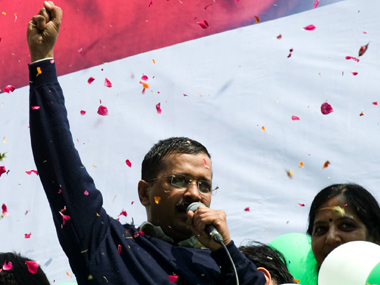New Delhi: From slashing electricity tariff by half, making water a right to creating jobs and ensuring a pro-business regime, Aam Aadmi Party convener and chief minister designate Arvind Kejriwal claims to have a roadmap for all the pre-poll promises of his party. Speaking to Firstpost briefly on Tuesday after the results were out, he said, “People trusted us and gave us a thumping majority. Now, it’s our turn to meet their expectations. And I am sure, we won’t disappoint them. We will fulfil all the promises we have made in our manifesto. We have already prepared a development plan with the help of domain experts. Everything is executable if you have the will power.” [caption id=“attachment_2092413” align=“alignleft” width=“380”]
 Kejriwal has promised to deliver on his promises. Naresh Sharma/ Firstpost[/caption] Among other things, the party has also promised installation of 15 lakh cameras, deployment of marshals in DTC buses, opening 500 new schools and 20 new colleges and setting up 30,000 new beds in city hospitals. It has also promised to tackle issues like the Swaraj Bill, Jan Lokpal and full statehood for Delhi. A reduction of 50 percent in power rates has been the most debated issue and experts say it is impossible to deliver. Kejriwal not surprisingly disagrees. “It can be done by ordering an audit of discoms and getting electricity bills checked by independent agencies and rectifying inflated bills,” he said. The AAP says its government will make water a right, but it appears to be unrealistic because the city faces a severe shortage of water. From where will the water come from? “Water is a basic need and it should be made available to everybody. As per our promises, there will be no charge for water needed for basic requirements. But consumption above it will of course be charged. Money saved by plugging loopholes will be enough to implement many schemes,” Kejriwal said. The AAP has promised to open 500 new schools, 20 colleges and has said it will add 30,000 new beds to city hospitals. This will require land, which is not controlled by the Delhi government. So how will it be possible? “Many people are willing to donate their land for new schools and colleges. In addition, we will urge the Urban Development Ministry to allow us to use free spaces for this purpose,” he said, reiterating that “everything is possible and it will be realised soon after our government starts functioning”. On the installation of 15 lakh cameras across the city, Kejriwal said, “It will cost around Rs 200 crores, which is not greater than the security of our mothers and sisters.” Asked how he will appoint marshals in government buses for women’s security as it would again need permission from the Union Home Ministry, he said, “The Delhi government can create a force which does not have legal power but assists police in its law and order duties. The other method is the Delhi Police commissioner can be urged to spare some personnel for the purpose.”
Kejriwal has promised to deliver on his promises. Naresh Sharma/ Firstpost[/caption] Among other things, the party has also promised installation of 15 lakh cameras, deployment of marshals in DTC buses, opening 500 new schools and 20 new colleges and setting up 30,000 new beds in city hospitals. It has also promised to tackle issues like the Swaraj Bill, Jan Lokpal and full statehood for Delhi. A reduction of 50 percent in power rates has been the most debated issue and experts say it is impossible to deliver. Kejriwal not surprisingly disagrees. “It can be done by ordering an audit of discoms and getting electricity bills checked by independent agencies and rectifying inflated bills,” he said. The AAP says its government will make water a right, but it appears to be unrealistic because the city faces a severe shortage of water. From where will the water come from? “Water is a basic need and it should be made available to everybody. As per our promises, there will be no charge for water needed for basic requirements. But consumption above it will of course be charged. Money saved by plugging loopholes will be enough to implement many schemes,” Kejriwal said. The AAP has promised to open 500 new schools, 20 colleges and has said it will add 30,000 new beds to city hospitals. This will require land, which is not controlled by the Delhi government. So how will it be possible? “Many people are willing to donate their land for new schools and colleges. In addition, we will urge the Urban Development Ministry to allow us to use free spaces for this purpose,” he said, reiterating that “everything is possible and it will be realised soon after our government starts functioning”. On the installation of 15 lakh cameras across the city, Kejriwal said, “It will cost around Rs 200 crores, which is not greater than the security of our mothers and sisters.” Asked how he will appoint marshals in government buses for women’s security as it would again need permission from the Union Home Ministry, he said, “The Delhi government can create a force which does not have legal power but assists police in its law and order duties. The other method is the Delhi Police commissioner can be urged to spare some personnel for the purpose.”
Exclusive: We will not disappoint you, Arvind Kejriwal tells Delhi
Tarique Anwar
• February 11, 2015, 09:19:12 IST
“People trusted us and gave us a thumping majority. Now, it’s our turn to meet their expectations,” Kejriwal told Firstpost. Here’s what else he said.
Advertisement
)
End of Article